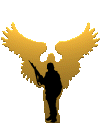This article from NYTimes.com
has been sent to you by spliffslips@aol.com.
Fort Sill Soldiers Missing
spliffslips@aol.com
/-------------------- advertisement -----------------------
Explore more of Starbucks at Starbucks.com.
http://www.starbucks.com/default.asp?ci=1015
\----------------------------------------------------------/
G.I. Dies, Others Are Wounded in New Ambushes in Iraq
June 28, 2003
By EDMUND L. ANDREWS
BAGHDAD, Iraq, June 27 - American soldiers came under fire
again today across Iraq, with one soldier shot in the head
and wounded while shopping and another killed in an ambush
late last night near the southern city of Najaf.
Meanwhile, Army troops searching for two missing soldiers
found their Humvee early this evening, according to an
official who spoke on condition of anonymity. The discovery
came after soldiers had detained three men for questioning
in the case, but the official said the Humvee showed no
signs of blood or any immediate clue as to what had
happened to the soldiers.
Pentagon officials said they themselves had scant details
on the men's disappearance. "All we know right now is we do
have two soldiers who are missing from their appointed
place of duty," Gen. Peter Pace, the vice chairman of the
Joint Chiefs of Staff, said in Washington. "We do not know
the specifics of what happened or why."
The Army identified the missing soldiers as Sgt. First
Class Gladimir Phillippe, 37, of Linden, N.J., and Pfc.
Kevin Ott, 27, of Columbus, Ohio.
The latest attacks were similar to those carried out with
increasing frequency over the last several weeks, and well
beyond the cities just north of Baghdad that were
strongholds of support for Saddam Hussein and where most of
the early attacks took place.
In Washington, Defense Secretary Donald H. Rumsfeld said
the attacks did not rise to the level of organized
guerrilla warfare. "I don't know that I would use the
word," he said after a closed meeting with senators on
Capitol Hill.
Mr. Rumsfeld said many of the attackers were common
criminals, as well as the remnants of Mr. Hussein's
Fedayeen Saddam and Baath Party."They are out doing things
that are unhelpful to the coalition, and the coalition is
taking every step possible to root them out," he said.
One of today's incidents occurred in Kadhimiya, one of the
busiest shopping districts in Baghdad. An area populated
primarily by Shiite Muslims, Kadhimiya has been one of the
most peaceful neighborhoods of Baghdad and has not been
known for anti-American hostility.
In today's attack, an unknown assailant shot a soldier in
the head and badly wounded him while he was trying to buy
video discs from a sidewalk vendor. Several witnesses said
they heard a shot ring out, saw the soldier's body lying on
the ground and began to flee out of fear that American
soldiers nearby would retaliate with more gunfire.
The shooting occurred about 11 a.m., just a few hundred
yards from a mosque that attracts thousands of worshipers
for Friday Prayers.
According to the United States Central Command, a soldier
was killed in a small town near Najaf while investigating a
car theft.
Najaf, a holy city for Shiite Muslims, had also been
comparatively peaceful until the last few days. Though many
there were unhappy about the presence of American
occupation forces, the city is both geographically and
culturally distant from the Sunni-dominated cities north of
Baghdad.
There were other violent incidents today. Unidentified
attackers fired a rocket-propelled grenade at a logistics
convoy near the city of Balad, about 60 miles north of
Baghdad, injuring one soldier. According to The Associated
Press, an Army truck hit an explosive device north of
Baghdad and several wounded Americans had to be evacuated
by helicopter.
At the 28th Combat Support Hospital, about 40 miles south
of Baghdad, doctors were grappling for a second day with
near record numbers of wounded, Iraqis as well as
Americans. "People don't understand what a dangerous
environment it is here just to be walking around," said Dr.
Denver Perkins, the hospital's chief of staff. Though many
of the incoming patients are being treated for illnesses
and accidental injuries, he said, the current surge of
emergencies stems primarily from attacks on soldiers.
On Thursday, an exceptionally heavy day, eight soldiers
were injured and one was killed on the road to the Baghdad
International Airport, when their Humvee drove over what
appears to have been a remote-controlled bomb.
Though not significant from a military standpoint, the
attacks have made American troops much jumpier and more
vulnerable to making deadly mistakes. A few days ago,
American soldiers entered a neighborhood here known as New
Baghdad just as an Iraqi man was firing a gun in the air.
Residents said that the Iraqi man was not aiming at
anybody, but that the American soldiers quickly fired at
the man, killing a bystander, and eventually fired dozens
of bullets into the walls and windows of stores along the
street.
Meanwhile, American military officials are also struggling
to prevent acts of sabotage against electrical power
plants, water pumping stations, sewage systems and
pipelines that transport oil and gas.
Today, most of Baghdad had little or no electric power for
the fifth straight day. The widespread power failures have
forced people to live without fans or air-conditioners as
temperatures rise to more than 110 degrees Fahrenheit. The
loss of power has also disrupted water supplies and sewage
systems, both of which rely on electric pumps.
"We cannot work, we cannot do anything," said Sultan Ali
Kazimi, a jewelry trader in Kadhimiya. "How is it that all
the military bases have electricity and we don't? They
promised to deliver us these things, but they have not
delivered on those promises."
To help the reconstruction effort, five national security
policy experts, led by a former deputy defense secretary,
John Hamre, left Washington for Iraq this week at the
invitation of the Pentagon.
Mr. Hamre heads the Center for Strategic and International
Studies, which published two detailed reports this year on
the rebuilding effort in Iraq. The reports came to the
attention of Mr. Rumsfeld, who aides said was impressed
enough to help arrange the 12-day trip.
A senior Defense Department spokesman, Larry Di Rita, said
the team's mission in no way impugned the work of L. Paul
Bremer III, the top American administrator in Iraq, who
also invited the team. "This team wasn't dispatched to
rescue Bremer because Bremer doesn't need rescuing," Mr. Di
Rita said.
http://www.nytimes.com/2003/06/28/international/worldspecial/28IRAQ.html?ex=1057767390&ei=1&en=839f89cc64161f82
---------------------------------
Get Home Delivery of The New York Times Newspaper. Imagine
reading The New York Times any time & anywhere you like!
Leisurely catch up on events & expand your horizons. Enjoy
now for 50% off Home Delivery! Click here:
http://www.nytimes.com/ads/nytcirc/index.html
HOW TO ADVERTISE
---------------------------------
For information on advertising in e-mail newsletters
or other creative advertising opportunities with The
New York Times on the Web, please contact
onlinesales@nytimes.com or visit our online media
kit at http://www.nytimes.com/adinfo
For general information about NYTimes.com, write to
help@nytimes.com.
Copyright 2003 The New York Times Company
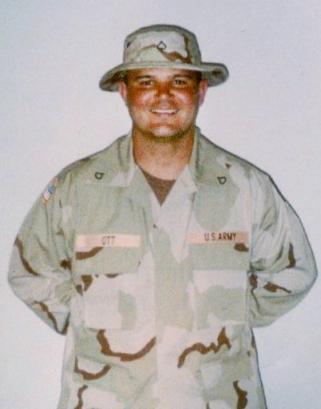 Army Pfc. Kevin Ott is shown in this undated family handout photo. After days of intense searching Iraq (news - web sites) by ground and air, U.S. forces on Saturday, June 28, 2003, found the bodies of two soldiers, including Otts, who were last seen Wednesday at their post in the town of Balad, Iraq. (AP Photo/Ott Family Photo)
Army Pfc. Kevin Ott is shown in this undated family handout photo. After days of intense searching Iraq (news - web sites) by ground and air, U.S. forces on Saturday, June 28, 2003, found the bodies of two soldiers, including Otts, who were last seen Wednesday at their post in the town of Balad, Iraq. (AP Photo/Ott Family Photo)  Army Pfc. Kevin Ott is shown in this undated family handout photo. After days of intense searching Iraq (news - web sites) by ground and air, U.S. forces on Saturday, June 28, 2003, found the bodies of two soldiers, including Otts, who were last seen Wednesday at their post in the town of Balad, Iraq. (AP Photo/Ott Family Photo)
Army Pfc. Kevin Ott is shown in this undated family handout photo. After days of intense searching Iraq (news - web sites) by ground and air, U.S. forces on Saturday, June 28, 2003, found the bodies of two soldiers, including Otts, who were last seen Wednesday at their post in the town of Balad, Iraq. (AP Photo/Ott Family Photo)  Army Pfc. Kevin Ott is shown in this undated family handout photo. After days of intense searching Iraq (news - web sites) by ground and air, U.S. forces on Saturday, June 28, 2003, found the bodies of two soldiers, including Otts, who were last seen Wednesday at their post in the town of Balad, Iraq. (AP Photo/Ott Family Photo)
Army Pfc. Kevin Ott is shown in this undated family handout photo. After days of intense searching Iraq (news - web sites) by ground and air, U.S. forces on Saturday, June 28, 2003, found the bodies of two soldiers, including Otts, who were last seen Wednesday at their post in the town of Balad, Iraq. (AP Photo/Ott Family Photo) 


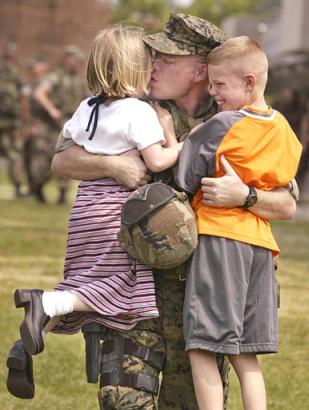 Staff Sgt. Jeramie D'Orta, 29, of Orange County, Va., a member of the 2nd Marine Expeditionary Brigade, is reunited with his daughter Nicole, 5, left, and son Vincent, 10, right, Saturday, June 28, 2003, at Camp Lejeune, N.C., as he returns from combat duty in Iraq (news - web sites). .(AP Photo/Bob Jordan)
Staff Sgt. Jeramie D'Orta, 29, of Orange County, Va., a member of the 2nd Marine Expeditionary Brigade, is reunited with his daughter Nicole, 5, left, and son Vincent, 10, right, Saturday, June 28, 2003, at Camp Lejeune, N.C., as he returns from combat duty in Iraq (news - web sites). .(AP Photo/Bob Jordan) 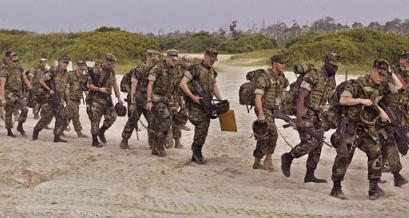
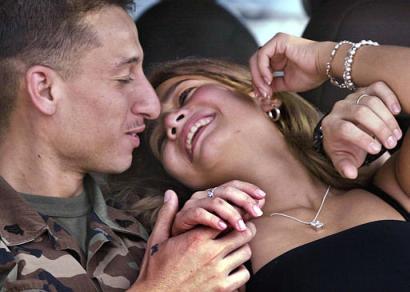 Cpl. Miguel Henao, left, a member of the 2nd Marine Expeditionary Brigade, enjoys a quiet moment with his wife Angelica as they are reunited Saturday, June 28, 2003, at Camp Lejeune, N.C., after he returned from combat duty in Iraq (news - web sites). (AP Photo/Bob Jordan)
Cpl. Miguel Henao, left, a member of the 2nd Marine Expeditionary Brigade, enjoys a quiet moment with his wife Angelica as they are reunited Saturday, June 28, 2003, at Camp Lejeune, N.C., after he returned from combat duty in Iraq (news - web sites). (AP Photo/Bob Jordan) 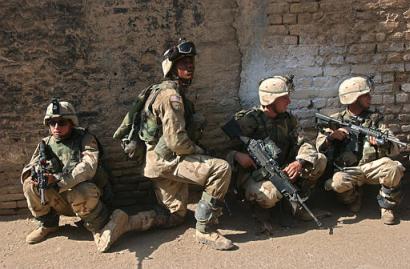 US soldiers from the 1st Armored Division take cover during a raid in a Baghdad neighborhood, Saturday, June 28, 2003. Dozens of soldiers raided an old sector of Baghdad, finding several Kalashnikovs and arresting two men. (AP Photo/Victor R. Caivano)
US soldiers from the 1st Armored Division take cover during a raid in a Baghdad neighborhood, Saturday, June 28, 2003. Dozens of soldiers raided an old sector of Baghdad, finding several Kalashnikovs and arresting two men. (AP Photo/Victor R. Caivano) 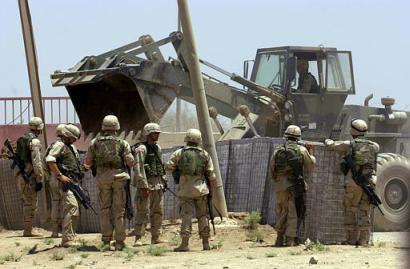 U.S. soldiers reinforce the gate of a 1st Armored Division outpost in Thawra neighborhood, Baghdad, Saturday, June 28, 2003. Attackers lobbed a grenade at a U.S. convoy making its way through a predominantly Shiite neighborhood late Friday, killing one American soldier and wounding four others. A civilian Iraqi interpreter was also wounded. (AP Photo/Victor R. Caivano)
U.S. soldiers reinforce the gate of a 1st Armored Division outpost in Thawra neighborhood, Baghdad, Saturday, June 28, 2003. Attackers lobbed a grenade at a U.S. convoy making its way through a predominantly Shiite neighborhood late Friday, killing one American soldier and wounding four others. A civilian Iraqi interpreter was also wounded. (AP Photo/Victor R. Caivano) 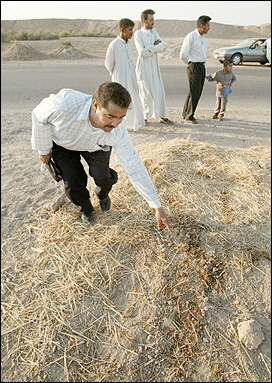 An Iraqi man points to the spot where the bodies of two US soldiers were found at Sabah al-Por, around 35 kilometres (20 miles) northwest of Baghdad(AFP/Marwan Naamani)
An Iraqi man points to the spot where the bodies of two US soldiers were found at Sabah al-Por, around 35 kilometres (20 miles) northwest of Baghdad(AFP/Marwan Naamani)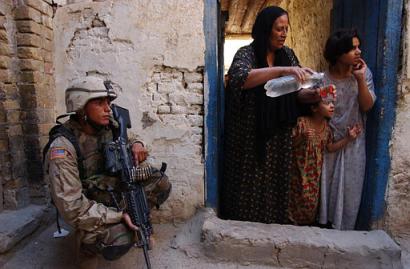 A US soldier from the 1st Armored Division takes cover while an Iraqi women offers water for the soldiers during a raid in a Baghdad neighborhood, Saturday, June 28, 2003. Dozens of soldiers raided an old sector of Baghdad, finding several Kalashnikovs and arresting two men. (AP Photo/Victor R. Caivano)
A US soldier from the 1st Armored Division takes cover while an Iraqi women offers water for the soldiers during a raid in a Baghdad neighborhood, Saturday, June 28, 2003. Dozens of soldiers raided an old sector of Baghdad, finding several Kalashnikovs and arresting two men. (AP Photo/Victor R. Caivano) 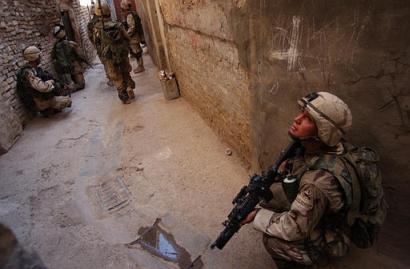 A US soldier from the 1st Armored Division takes cover during a raid in a Baghdad neighborhood, Saturday, June 28, 2003. Dozens of soldiers raided an old sector of Baghdad, finding several Kalashnikovs and arresting two men. (AP Photo/Victor R. Caivano)
A US soldier from the 1st Armored Division takes cover during a raid in a Baghdad neighborhood, Saturday, June 28, 2003. Dozens of soldiers raided an old sector of Baghdad, finding several Kalashnikovs and arresting two men. (AP Photo/Victor R. Caivano) 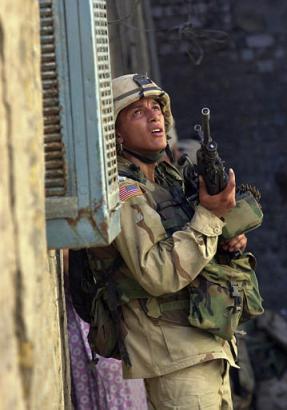 A soldier from the US 1st Armored Division takes cover during a raid in a Baghdad neighborhood, Saturday, June 28, 2003. Dozens of soldiers raided an old sector of Baghdad, finding several Kalashnikovs and arresting two men. (AP Photo/Victor R. Caivano)
A soldier from the US 1st Armored Division takes cover during a raid in a Baghdad neighborhood, Saturday, June 28, 2003. Dozens of soldiers raided an old sector of Baghdad, finding several Kalashnikovs and arresting two men. (AP Photo/Victor R. Caivano) 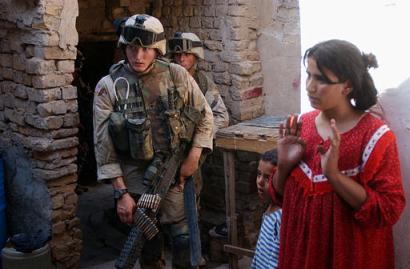 US soldiers from the 1st Armored Division enter an Iraqi home during a raid in a Baghdad neighborhood, Saturday, June 28, 2003. Dozens of soldiers raided an old sector of Baghdad, finding several Kalashnikovs and arresting two men. (AP Photo/Victor R. Caivano
US soldiers from the 1st Armored Division enter an Iraqi home during a raid in a Baghdad neighborhood, Saturday, June 28, 2003. Dozens of soldiers raided an old sector of Baghdad, finding several Kalashnikovs and arresting two men. (AP Photo/Victor R. Caivano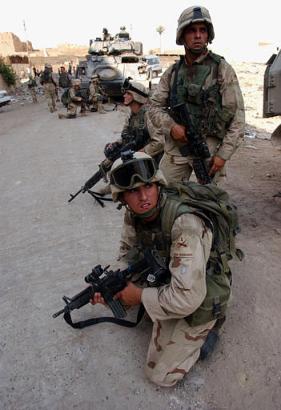 US soldiers from the 1st Armored Division take cover after exiting from a Bradley armored vehicle before a raid in a Baghdad neighborhood, Saturday, June 28, 2003. Dozens of soldiers raided an old sector of Baghdad, finding several Kalashnikovs and arresting two men. (AP Photo/Victor R. Caivano)
US soldiers from the 1st Armored Division take cover after exiting from a Bradley armored vehicle before a raid in a Baghdad neighborhood, Saturday, June 28, 2003. Dozens of soldiers raided an old sector of Baghdad, finding several Kalashnikovs and arresting two men. (AP Photo/Victor R. Caivano) 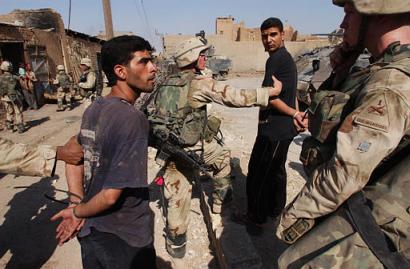 US soldiers from the 1st Armored Division take cover after exiting from a Bradley armored vehicle before a raid in a Baghdad neighborhood, Saturday, June 28, 2003. Dozens of soldiers raided an old sector of Baghdad, finding several Kalashnikovs and arresting two men. (AP Photo/Victor R. Caivano)
US soldiers from the 1st Armored Division take cover after exiting from a Bradley armored vehicle before a raid in a Baghdad neighborhood, Saturday, June 28, 2003. Dozens of soldiers raided an old sector of Baghdad, finding several Kalashnikovs and arresting two men. (AP Photo/Victor R. Caivano) 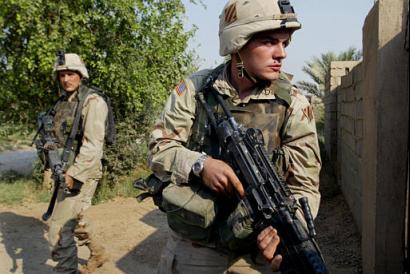 U.S. Army soldiers from A Company 3rd Battalion 7th Infantry Regiment patrol through an area of Karbala, Iraq (news - web sites) about 60 kilometers west of Baghdad Saturday, June 28, 2003.(AP Photo/John Moore)
U.S. Army soldiers from A Company 3rd Battalion 7th Infantry Regiment patrol through an area of Karbala, Iraq (news - web sites) about 60 kilometers west of Baghdad Saturday, June 28, 2003.(AP Photo/John Moore) 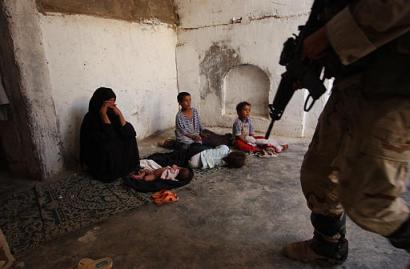 A U.S. soldier from the 1st Armored Division enters an Iraqi home as soldiers search for a hidden weapons' cache in a Baghdad neighborhood, Saturday, June 28, 2003. The soldiers found several Kalashnikovs and arrested two men. (AP Photo/Victor R. Caivano)
A U.S. soldier from the 1st Armored Division enters an Iraqi home as soldiers search for a hidden weapons' cache in a Baghdad neighborhood, Saturday, June 28, 2003. The soldiers found several Kalashnikovs and arrested two men. (AP Photo/Victor R. Caivano) 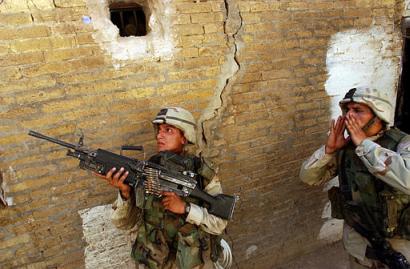 A U.S. soldier from the 1st Armored Division takes cover after hearing a shot while another soldier shouts to ask about the status of the squad in front of them in a Baghdad neighborhood, Saturday, June 28, 2003. The soldiers found several Kalashnikovs and arrested two men. (AP Photo/Victor R. Caivano)
A U.S. soldier from the 1st Armored Division takes cover after hearing a shot while another soldier shouts to ask about the status of the squad in front of them in a Baghdad neighborhood, Saturday, June 28, 2003. The soldiers found several Kalashnikovs and arrested two men. (AP Photo/Victor R. Caivano) 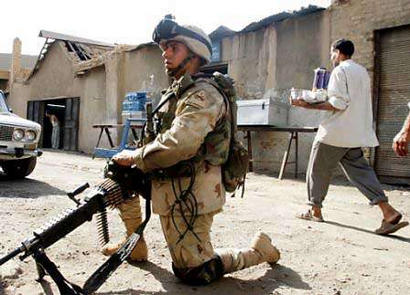 A U.S. army soldier guards the street during a weapons search on the outskirts of Baghdad June 28, 2003. Attacks on the occupation forces have continued unabated in recent days, underscoring the hazards of occupying a country the size of California with a heavily armed population. Photo by Akram Saleh/Reuters
A U.S. army soldier guards the street during a weapons search on the outskirts of Baghdad June 28, 2003. Attacks on the occupation forces have continued unabated in recent days, underscoring the hazards of occupying a country the size of California with a heavily armed population. Photo by Akram Saleh/Reuters 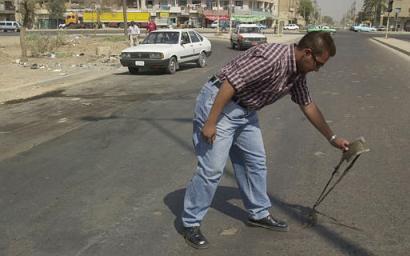 Witness Omar Abdul Hussein retrieves a blood-soaked first aid bandage Saturday, June 28, 2003 at Al Mashtel southeast of Baghdad, the site of another attack on a US military humvee patrol Friday evening. Unknown men attacked the patrol with a rocket propelled grenade killing one US soldier and wounding four others. The US forces in Iraq (news - web sites) have been under increasing guerilla-style attacks lately. (AP Photo/Samir Mezban)
Witness Omar Abdul Hussein retrieves a blood-soaked first aid bandage Saturday, June 28, 2003 at Al Mashtel southeast of Baghdad, the site of another attack on a US military humvee patrol Friday evening. Unknown men attacked the patrol with a rocket propelled grenade killing one US soldier and wounding four others. The US forces in Iraq (news - web sites) have been under increasing guerilla-style attacks lately. (AP Photo/Samir Mezban) 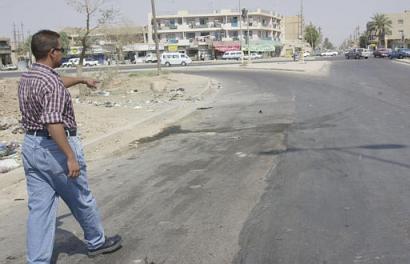
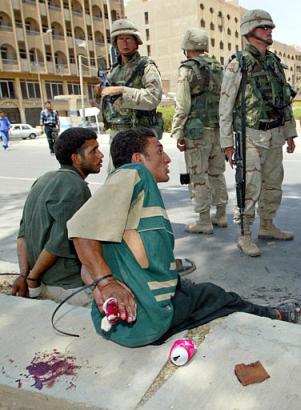 The US 1st Armored Division soldiers detaining suspected Iraqis drug addict and possession of illegal weapons near Palestine hotel in Baghdad, on Saturday June 28, 2003. (AP Photo/Mikhail Metzel)
The US 1st Armored Division soldiers detaining suspected Iraqis drug addict and possession of illegal weapons near Palestine hotel in Baghdad, on Saturday June 28, 2003. (AP Photo/Mikhail Metzel) 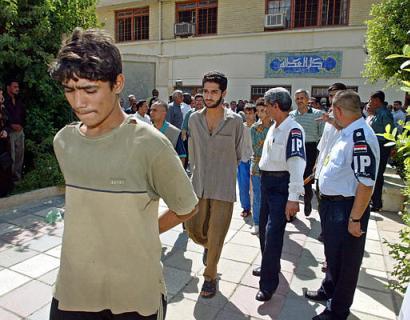 Iraqi felons are escorted back to jail after a hearing in a court in Baghdad, Iraq (news - web sites) on Saturday June 28, 2003. Baghdad courts reopened on Saturday to try Iraqis who were arrested for looting the capital and for possession of illegal weapons. (AP Photo/Mikhail Metzel)
Iraqi felons are escorted back to jail after a hearing in a court in Baghdad, Iraq (news - web sites) on Saturday June 28, 2003. Baghdad courts reopened on Saturday to try Iraqis who were arrested for looting the capital and for possession of illegal weapons. (AP Photo/Mikhail Metzel) 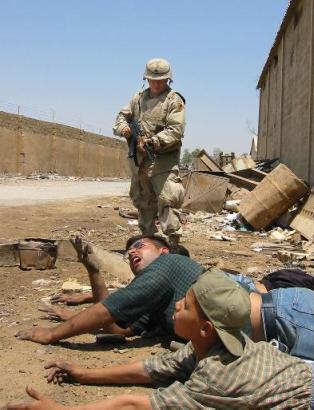 A US soldier stands guard as a suspected looter begs to be released after they were caught while fleeing a building on fire in Baghdad, Iraq (news - web sites) Saturday June 28, 2003. The suspects were allegedly looting gasoline from the building. 12-year old Mudhr Abdul Muhsin, bottom, was released later. (AP Photo/Hadi Mezban)
A US soldier stands guard as a suspected looter begs to be released after they were caught while fleeing a building on fire in Baghdad, Iraq (news - web sites) Saturday June 28, 2003. The suspects were allegedly looting gasoline from the building. 12-year old Mudhr Abdul Muhsin, bottom, was released later. (AP Photo/Hadi Mezban)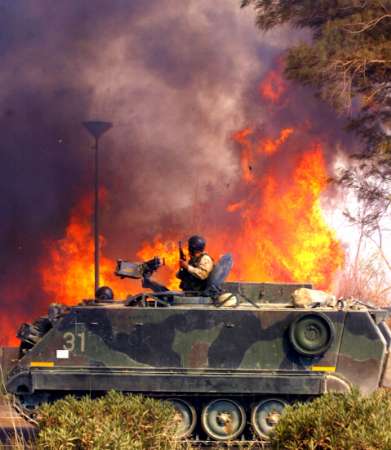 A U.S. soldier watches as garbage is burned in Baghdad, June 28, 2003. The city services are still scarce despite coalition forces struggle to re-establish the basics like electricity and water since ousting Saddam Hussein (news - web sites)'s regime. REUTERS/Faleh Kheiber
A U.S. soldier watches as garbage is burned in Baghdad, June 28, 2003. The city services are still scarce despite coalition forces struggle to re-establish the basics like electricity and water since ousting Saddam Hussein (news - web sites)'s regime. REUTERS/Faleh Kheiber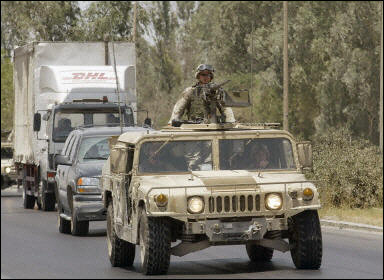 A US Humvee escorts a DHL lorry carrying letters for US troops, making its way to Dhuluiya, north of Baghdad. US troops scoured this rural Sunni Muslim belt for signs of the two US soldiers now found dead.(AFP/Marwan Naamani)
A US Humvee escorts a DHL lorry carrying letters for US troops, making its way to Dhuluiya, north of Baghdad. US troops scoured this rural Sunni Muslim belt for signs of the two US soldiers now found dead.(AFP/Marwan Naamani) 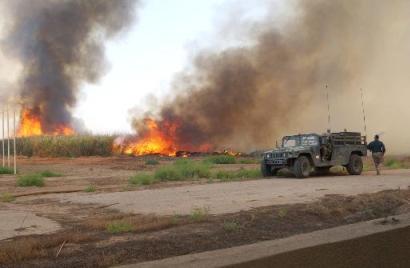 US soldiers in a humvee monitor a bush fire in Baghdad, Iraq (news - web sites), Saturday June 28, 2003. Fires occur quite frequently in the capital lately, mostly triggered by looters, and are compounded by the searing heat which soars to about 43 degress C (110 degrees fahrenheit). (AP Photo/Ali Haider)
US soldiers in a humvee monitor a bush fire in Baghdad, Iraq (news - web sites), Saturday June 28, 2003. Fires occur quite frequently in the capital lately, mostly triggered by looters, and are compounded by the searing heat which soars to about 43 degress C (110 degrees fahrenheit). (AP Photo/Ali Haider)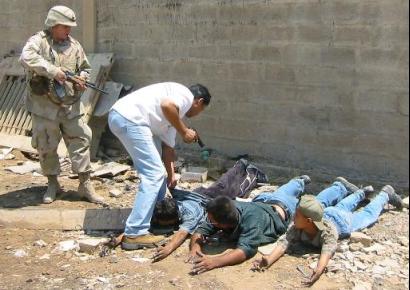 A US soldier watches as an Iraqi translator for the US Army and with a drawn pistol searches for identification of suspected looters after they were caught fleeing the building which caught fire in Baghdad, Iraq (news - web sites) Saturday June 28, 2003. The suspects were allegedly looting gasoline from the building. 12-year old Mudhr Abdul Muhsin, right, was released later. (AP Photo/Hadi Mezban)
A US soldier watches as an Iraqi translator for the US Army and with a drawn pistol searches for identification of suspected looters after they were caught fleeing the building which caught fire in Baghdad, Iraq (news - web sites) Saturday June 28, 2003. The suspects were allegedly looting gasoline from the building. 12-year old Mudhr Abdul Muhsin, right, was released later. (AP Photo/Hadi Mezban) 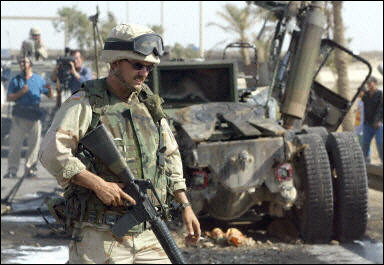 A US soldier walking past a destroyed military vehicle in the al-Dura district of Baghdad. One soldier was killed and four others wounded in a grenade attack on a convoy.(AFP/File/Cris Bouroncle)
A US soldier walking past a destroyed military vehicle in the al-Dura district of Baghdad. One soldier was killed and four others wounded in a grenade attack on a convoy.(AFP/File/Cris Bouroncle) 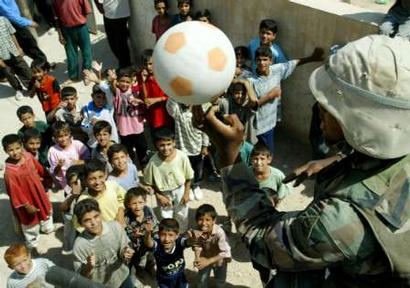
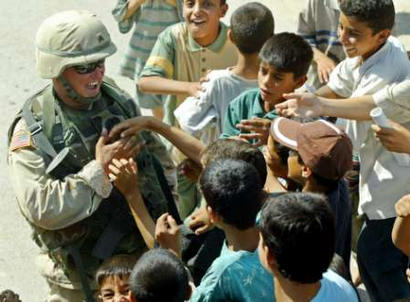 U.S. Army Sgt. Andrew Brophy from Ridge, New York, plays with Iraqi children at Al-Imam primary school June 28, 2003 in Al-Sadiq city, near Baghdad. A U.S. humanitarian aid affiliate to Coalition Provisional Authority has began supplying schools which basic facilities following the looting and destruction which took place after the fall of the Saddam regime. REUTERS/Radu Sigheti
U.S. Army Sgt. Andrew Brophy from Ridge, New York, plays with Iraqi children at Al-Imam primary school June 28, 2003 in Al-Sadiq city, near Baghdad. A U.S. humanitarian aid affiliate to Coalition Provisional Authority has began supplying schools which basic facilities following the looting and destruction which took place after the fall of the Saddam regime. REUTERS/Radu Sigheti 


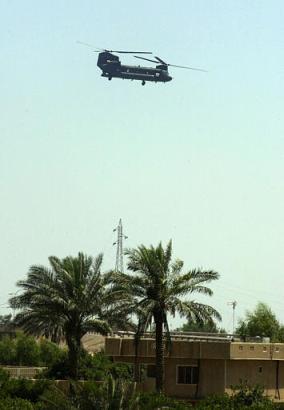
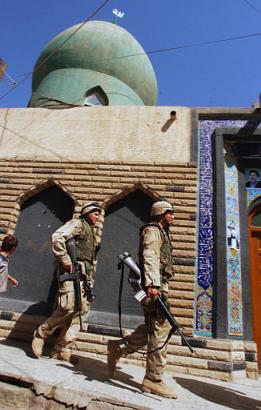 U.S. soldiers pass by a mosque as they patrol the inner section of Balad, some 40 miles (60 kms) north of Baghdad, Iraq (news - web sites), Friday June 27, 2003. Three Iraqis are being interrogated after two soldiers and their Humvee were reported missing while guarding the perimeter of a rocket demolition site near the town of Balad. (AP Photo/Victor R. Caivano)
U.S. soldiers pass by a mosque as they patrol the inner section of Balad, some 40 miles (60 kms) north of Baghdad, Iraq (news - web sites), Friday June 27, 2003. Three Iraqis are being interrogated after two soldiers and their Humvee were reported missing while guarding the perimeter of a rocket demolition site near the town of Balad. (AP Photo/Victor R. Caivano) 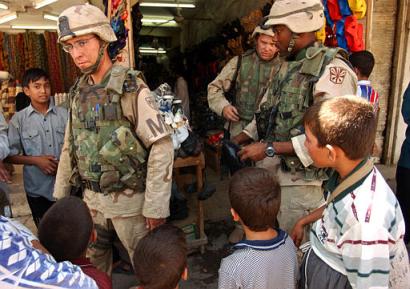
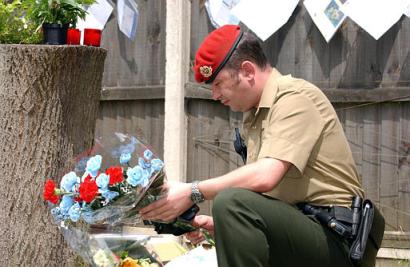 Flowers are placed by Cpl. Mark Brown of 156 Provost Company, at the memorial set up in the military police station garden in Colchester, England, Thursday June 26, 2003, for the six British soldiers killed in Iraq The Ministry of Defence announced it was with 'very deep regret' that Corporal Russell Aston, Lance Corporal Ben Hyde, Lance Corporal Thomas Richard Keys, Corporal Simon Miller, Sergeant Simon Hamilton-Jewell and Corporal Paul Long were killed in action. (AP Photo/ PA, Nick Strugnell/Pool)
Flowers are placed by Cpl. Mark Brown of 156 Provost Company, at the memorial set up in the military police station garden in Colchester, England, Thursday June 26, 2003, for the six British soldiers killed in Iraq The Ministry of Defence announced it was with 'very deep regret' that Corporal Russell Aston, Lance Corporal Ben Hyde, Lance Corporal Thomas Richard Keys, Corporal Simon Miller, Sergeant Simon Hamilton-Jewell and Corporal Paul Long were killed in action. (AP Photo/ PA, Nick Strugnell/Pool) 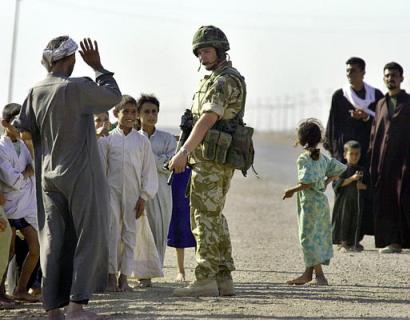 An Iraqi waves to a British soldier on patrol near the village of Majar al-Kabir, Iraq (news - web sites), Friday June 27, 2003. Six British soldiers and at least five Iraqi civilians were killed in violent clashes in Majar al-Kabir last week. (AP Photo/Denis Doyle)
An Iraqi waves to a British soldier on patrol near the village of Majar al-Kabir, Iraq (news - web sites), Friday June 27, 2003. Six British soldiers and at least five Iraqi civilians were killed in violent clashes in Majar al-Kabir last week. (AP Photo/Denis Doyle)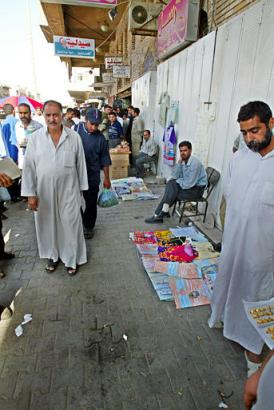 Iraqis go about their normal buisness along the place where a U.S. soldier was killed on Friday, June 27, 2003, Baghdad, Iraq A gunman shot a U.S. soldier shopping for video compact discs on a sidewalk in northwest of Baghdad. At least three U.S. military personnel have been killed in Iraq since Thursday, two of them in ambushes against U.S. led occupation forces. (AP Photo/Mikhail Metzel)
Iraqis go about their normal buisness along the place where a U.S. soldier was killed on Friday, June 27, 2003, Baghdad, Iraq A gunman shot a U.S. soldier shopping for video compact discs on a sidewalk in northwest of Baghdad. At least three U.S. military personnel have been killed in Iraq since Thursday, two of them in ambushes against U.S. led occupation forces. (AP Photo/Mikhail Metzel) 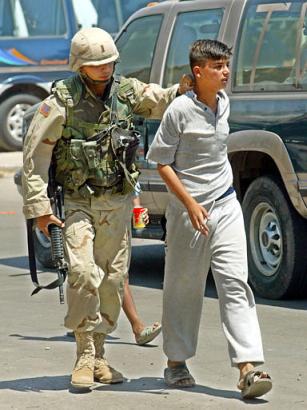 A soldier from the US Army's 1st Armored Division soldier escorts a suspected drug addict away from the Palestine Hotel, where some American troops and international media are stationed in Baghdad, Iraq (news - web sites) on Friday June 27, 2003. (AP Photo/Mikhail Metzel)
A soldier from the US Army's 1st Armored Division soldier escorts a suspected drug addict away from the Palestine Hotel, where some American troops and international media are stationed in Baghdad, Iraq (news - web sites) on Friday June 27, 2003. (AP Photo/Mikhail Metzel) 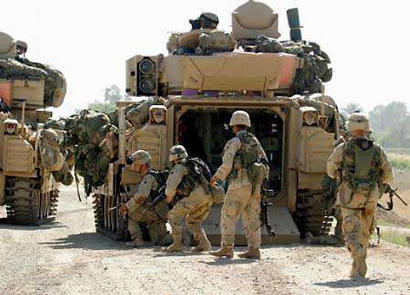 U.S. Army soldiers move under the cover of their armored vehicles June 27, 2003, while searching for two missing American soldiers, in the Balad area, a hotbed of resistance to the U.S. presence, north of Baghdad. U.S. officers said they had detained three Iraqis in connection with the disappearance of the soldiers. Photo by Akram Saleh/Reuters
U.S. Army soldiers move under the cover of their armored vehicles June 27, 2003, while searching for two missing American soldiers, in the Balad area, a hotbed of resistance to the U.S. presence, north of Baghdad. U.S. officers said they had detained three Iraqis in connection with the disappearance of the soldiers. Photo by Akram Saleh/Reuters 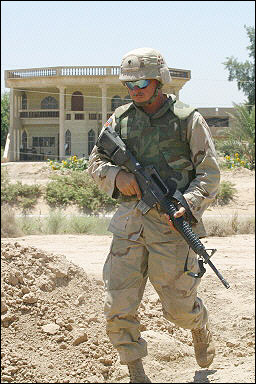 A US soldier on foot patrol makes his way past a house near the town of Balad, north of Baghdad. Two US soldiers from 3rd Infantry Division were believed to have gone missing in a remote location around 40 kilometres (25 miles) south of Balad.(AFP/Ahmad Al-Rubaye)
A US soldier on foot patrol makes his way past a house near the town of Balad, north of Baghdad. Two US soldiers from 3rd Infantry Division were believed to have gone missing in a remote location around 40 kilometres (25 miles) south of Balad.(AFP/Ahmad Al-Rubaye) 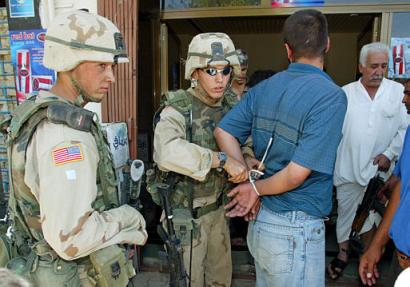 US soldiers from the 1st Armored Division detain a suspected Ba'ath Party member in Baghdad, Iraq on Friday June 27, 2003. (AP Photo/Mikhail Metzel)
US soldiers from the 1st Armored Division detain a suspected Ba'ath Party member in Baghdad, Iraq on Friday June 27, 2003. (AP Photo/Mikhail Metzel) 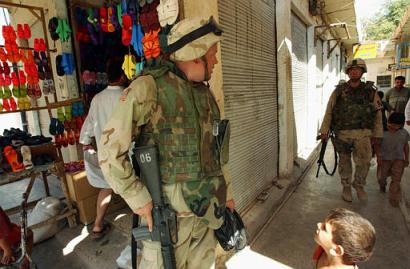 US soldiers patrol the inner section of Balad, some 40 miles (60 kms) north of Baghdad, Iraq on Friday June 27, 2003. Three Iraqis are being interrogated after two soldiers and their Humvee were reported missing while guarding the perimeter of a rocket demolition site near the town of Balad. (AP Photo/Victor Caivano
US soldiers patrol the inner section of Balad, some 40 miles (60 kms) north of Baghdad, Iraq on Friday June 27, 2003. Three Iraqis are being interrogated after two soldiers and their Humvee were reported missing while guarding the perimeter of a rocket demolition site near the town of Balad. (AP Photo/Victor Caivano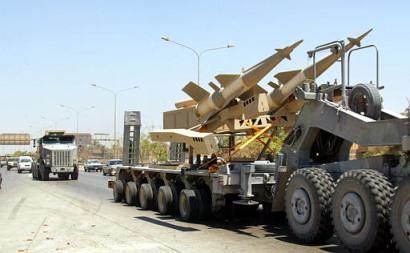 Iraqi missiles are transported to a safer place for further testing on Friday June 27, 2003 in Baghdad, Iraq (news - web sites). Following the war in Iraq that ousted Saddam Hussein (news - web sites) from power, the search continues for weapons of mass destruction. (AP Photo/Bullit Marquez)
Iraqi missiles are transported to a safer place for further testing on Friday June 27, 2003 in Baghdad, Iraq (news - web sites). Following the war in Iraq that ousted Saddam Hussein (news - web sites) from power, the search continues for weapons of mass destruction. (AP Photo/Bullit Marquez) 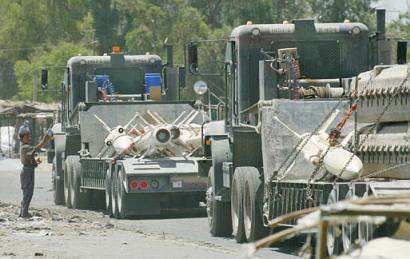 A boy cheers a passing convoy transporting Iraqi missiles to a safer place for further testing, Friday June 27, 2003 Baghdad, Iraq (news - web sites). Following the war in Iraq that ousted Saddam Hussein (news - web sites) from power, the search continues for weapons of mass destruction. (AP Photo/Bullit Marquez)
A boy cheers a passing convoy transporting Iraqi missiles to a safer place for further testing, Friday June 27, 2003 Baghdad, Iraq (news - web sites). Following the war in Iraq that ousted Saddam Hussein (news - web sites) from power, the search continues for weapons of mass destruction. (AP Photo/Bullit Marquez) 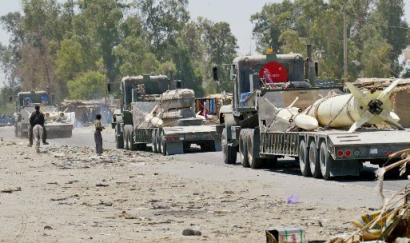 A convoy of U.S. trailers with Iraqi weapons passes through an impoverished neighborhood in Baghdad, Iraq (news - web sites) on Friday June 27, 2003. The weapons were taken to a safer place for further testing on Friday. Following the war in Iraq that ousted Saddam Hussein (news - web sites) from power, the search continues for weapons of mass destruction. (AP Photo/Bullit Marquez)
A convoy of U.S. trailers with Iraqi weapons passes through an impoverished neighborhood in Baghdad, Iraq (news - web sites) on Friday June 27, 2003. The weapons were taken to a safer place for further testing on Friday. Following the war in Iraq that ousted Saddam Hussein (news - web sites) from power, the search continues for weapons of mass destruction. (AP Photo/Bullit Marquez) 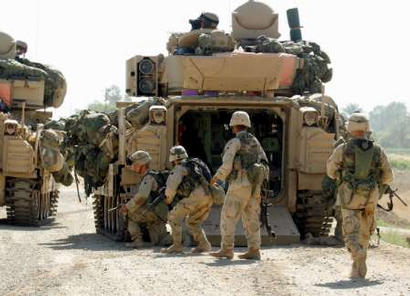 U.S. Army soldiers move under the cover of their armored vehicles June 27, 2003, while searching for two missing American soliders, supposedly abducted in Balad area, a hotbed of resistance to the U.S. presence, some 60 km north of Baghdad. Attackers launched new strikes on U.S. targets in Iraq (news - web sites) in sharply escalating resistance to occupation nearly three months after Saddam Hussein (news - web sites)'s fall. REUTERS/Akram Saleh
U.S. Army soldiers move under the cover of their armored vehicles June 27, 2003, while searching for two missing American soliders, supposedly abducted in Balad area, a hotbed of resistance to the U.S. presence, some 60 km north of Baghdad. Attackers launched new strikes on U.S. targets in Iraq (news - web sites) in sharply escalating resistance to occupation nearly three months after Saddam Hussein (news - web sites)'s fall. REUTERS/Akram Saleh 
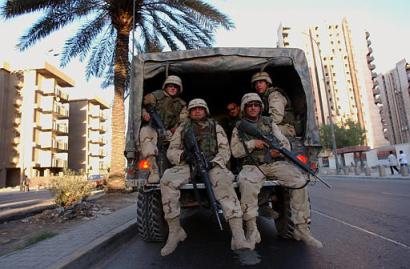
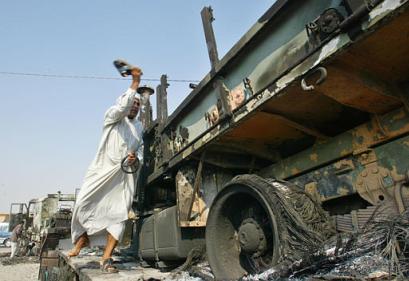
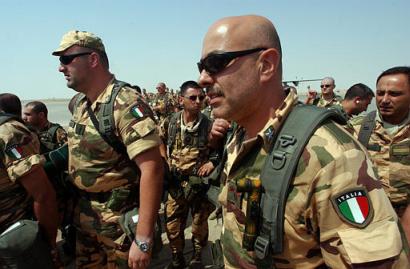
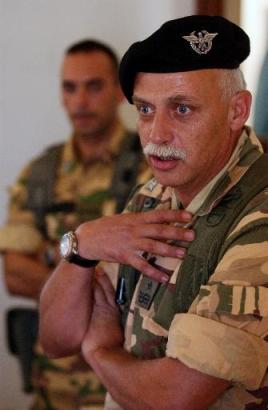
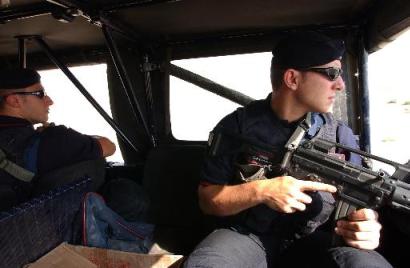
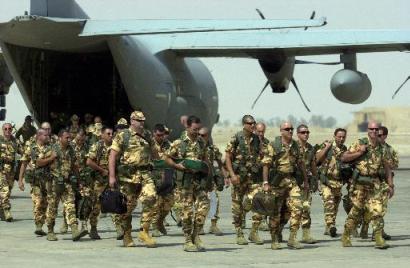
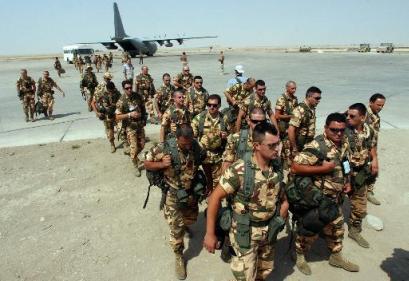

 U.S. Army military police Capt. Joe Hissim from Oxford, New Jersey helps an Iraqi policeman to adjust his new armband June 23, 2003 at the local police headquarters in Falluja, northwest of Baghdad. U.S. troops from the 2nd Brigade Combat Team issued new uniforms, weapons and patrol cars to the local Iraqi police force. REUTERS/Radu Sigheti
U.S. Army military police Capt. Joe Hissim from Oxford, New Jersey helps an Iraqi policeman to adjust his new armband June 23, 2003 at the local police headquarters in Falluja, northwest of Baghdad. U.S. troops from the 2nd Brigade Combat Team issued new uniforms, weapons and patrol cars to the local Iraqi police force. REUTERS/Radu Sigheti 